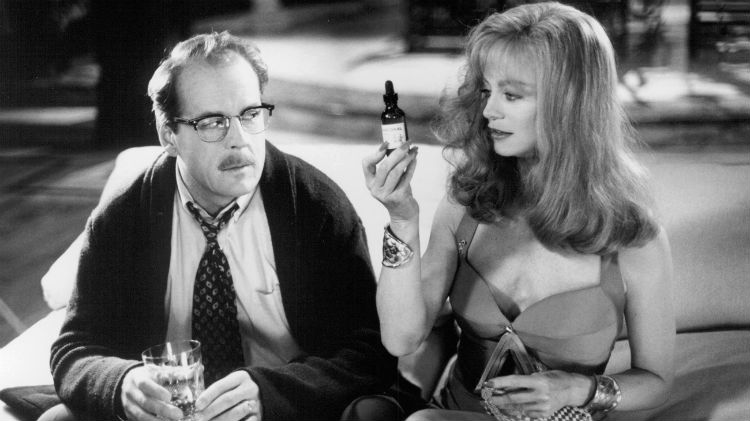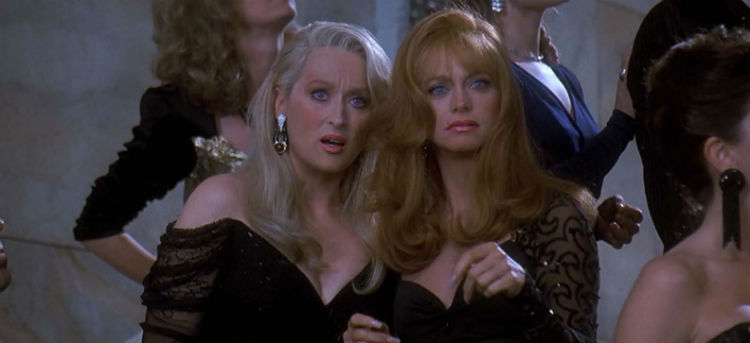Death Becomes Her at 25 | Over the Top and Under the Bottom
When I was young, my family had a great film collection. One corner of the living room was dedicated to a whopping four shelves of VHS tapes; a portion of them, as you might expect, were store bought movies and TV shows, but the majority of them were movies we had recorded off the telly.
Movies were still special in those days you see, because buying a movie wasn’t cheap; videos were about fifteen quid and sky movies cost a shitload. As a result, most people would see films for the first time on the TV and it would be something of an occasion because you had no idea when a film was going to be shown again. So, either you made sure that you were sat in front of the TV at the right time, or if you were lucky enough to have a video recorder, you would record it.
My family would record all the films we thought we might want to see again, three or four per video normally, depending on the length of the movie and if we remembered to set it to long play. I would end up watching a lot of films over and over again and certain ones became special to me: Twins, Flight of the Navigator, Brewster’s Millions, Jurassic Park and Death Becomes Her. When I first watched these films, I was at an age where the people involved in a movie didn’t matter. I made no judgment on what a movie would be like before I watched it I just watched the film and enjoyed it or didn’t.
As I look back at Death Becomes Her today however, I can see the group of fine actors and movie makers that are at its heart. Robert Zemeckis (Back to the Future etc) directed, David Koepp (Jurassic Park*, Carlito’s Way, Spiderman, Indiana Jones and the Kingdom of the Crystal Skull… yeah, forget about that one) and Martin Donovan (Mary Tyler Moore Show) wrote the screenplay; Meryl Streep (off of the Oscars), Goldie Hawn (off of the eighties), Bruce Willis (That one with Zack from Saved by the Bell in – look it up.) and Isabella Rossellini (who is so scary in it my teenage self wasn’t even that bothered by the fact that she’s practically naked all the time) starred. I had no idea Zemeckis had directed some of my favourite movies, I wouldn’t watch anything else with Meryl Streep or Bruce Willis for years, in fact the only one I was aware of was Goldie Hawn because of Overboard.

Even when, years later, I watched Pulp Fiction and Twelve Monkeys it didn’t click that this bald, intense dude was the weaselly, panicky guy in Death… And I honestly think that Death Becomes Her is home to Bruce Willis’s finest role. Think about it. Streep can do anything, we know that, and this is the kind of role Goldie Hawn excels at – although here she really plays three different characters, but more on that later. Willis, however, is unrecognisable. He doesn’t crack wise and he doesn’t do that quiet sombre thing he’s so known for post The Sixth Sense.
Here he plays plastic surgeon Ernest Menville, a weaselly, schlep of a man who, when we join him, is engaged to Helen Sharp (Hawn). Helen introduces him to her old friend, the glamorous Madeline Ashton (Streep) as a test, to see if Ernest can stay faithful after meeting her as Helen has ‘lost men to her before’. Ernest assures Helen that she’s being ridiculous and that he loves her so naturally in the very next scene Ernest is marrying Madeline. Willis plays his part a lot broader than he normally would and I believe that doing this kind comedy well is a lot harder than nuanced, powerful, dramatic acting. You often see broad comic actors able to do dramatic turns (Adam Sandler, Jim Carrey, Will Ferrell) but very rarely can it be done the other way round. Willis disappears in to this role so much that none of his other acting tropes bleed through and it is like nothing he’s done before or since.
Meryl Streep has even acknowledged that this role was a challenge. In one interview she compares her performance in Death Becomes Her to her other work:
Postcards from the Edge was the easiest kind of comedy for me to do because it was grounded in something real and it had an emotional base. This is absolutely through the roof, hyperbolic farce. In one take we would try to do one take that had some grounding in human experience, and then the sky was the limit.
If the Streepmeister general was struggling, you know it was hard.
Goldie Hawn probably has the hardest job however, as she has to play her character in three very different guises and still sell it to the audience. At the beginning she is a meek, nervous, jealous wreck who has a breakdown when her fiancé leaves her. Then seven years later we find her depressed, alone and over weight and, for a small amount of time, incarcerated in a psychiatric hospital, obsessed over Madeline Ashton. These first two guises were probably the hardest for her to do as the amount of screen time they get is pretty small and we have to believe her journey with the minimum amount of acting from Hawn. Then, when we meet her another seven years down the line, she is svelte, glamorous and confident and not just a little evil.
One of the best things about Death Becomes Her, and there are a lot of things to love about it, is there is nobody likeable in the film at all. Ernest, as already mentioned is a weak, pathetic man who is easily tempted away from the person he “loves” by whoever looks the “prettiest”; Madeline becomes a demanding diva who treats Ernest like dirt; and Helen, who we should feel the most sympathy for, morphs in to a scheming hellion herself. Despite this there are moments in the movie you feel bad for all of them, as they slowly become more and more pathetic. Ernest – as he flits between the women and ultimately runs scared from both, Helen – as she plots Madeline’s demise and never manages to get her man** and Madeline as she falls dramatically from glamorous star to ageing reject.

The film is not without its critics. Some said at the time that it relied too heavy on special effects and not enough on plot. Some said it was too broad. But the fact is that both of these criticisms are missing the point.
This is a farce, but with the ante upped. People get pushed down stairs, shot and, in one delightful deleted scene, shoved in a freezer. It isn’t meant to be high minded it’s meant to be high concept. The set pieces may be less than subtle, but these are balanced out by gags that are ‘blink and you’ll miss them’ fast, or so underplayed that they don’t really get the credit they deserve.
For example: upon Madeline first getting her neck broken and has it twisted round, when she twists it back there is a very funny and subtle cracked bone sticking out that doesn’t get referred to. Another great example is the spade fight between the warring women. After getting a good whack with the spade from Helen, Madeline ends up with her head hanging backwards off her body, Looney Tunes style. Afterwards she has to keep pulling her head up, eventually holding it by the hair and it’s a real lesson in how to do nuanced comedy in a high concept movie, because they never refer to it. They just let it be. You get the sense that if it was made today it would go one of two ways: either it would become an extremely gritty, dark comedy or someone like Adam Sandler or Judd Apatow would get hold of it and make it even broader and the jokes mentioned above would be met with a snappy remark or somehow shoehorn a dick joke in there
Death Becomes Her is both over the top and under the bottom at the same time and a film that could have only been made in the early nineties. It is a horror comedy revenge thriller that is equally loved and hated.
But there’s no getting away from the fact that at the end, when Willis’ character has died and Madeline and Helen have had to look after their own bodies through increasingly bad makeup jobs, their faces are not a million miles away from what you see on Made In Chelsea or Geordie Shore. And it’s things like that which make this movie one that will only continue to be a sharp satire of beauty for years to come and will probably never stop being relevant.
Like Madeline and Helen, this film will be around forever.
*with Micheal Crichton
**In fact the original ending was very different, and saw Madeline and Helen, years later, watching over an elderly Ernest and his new wife Toni – played by Tracey Ullman who’s scenes got cut from the film. They sit there being snide and Madeline is as self centred as ever, but Helen is still upset that she never got back with Ernest even after all those years.

